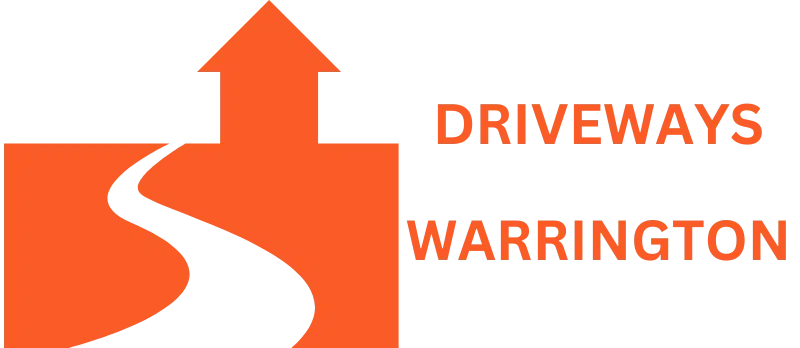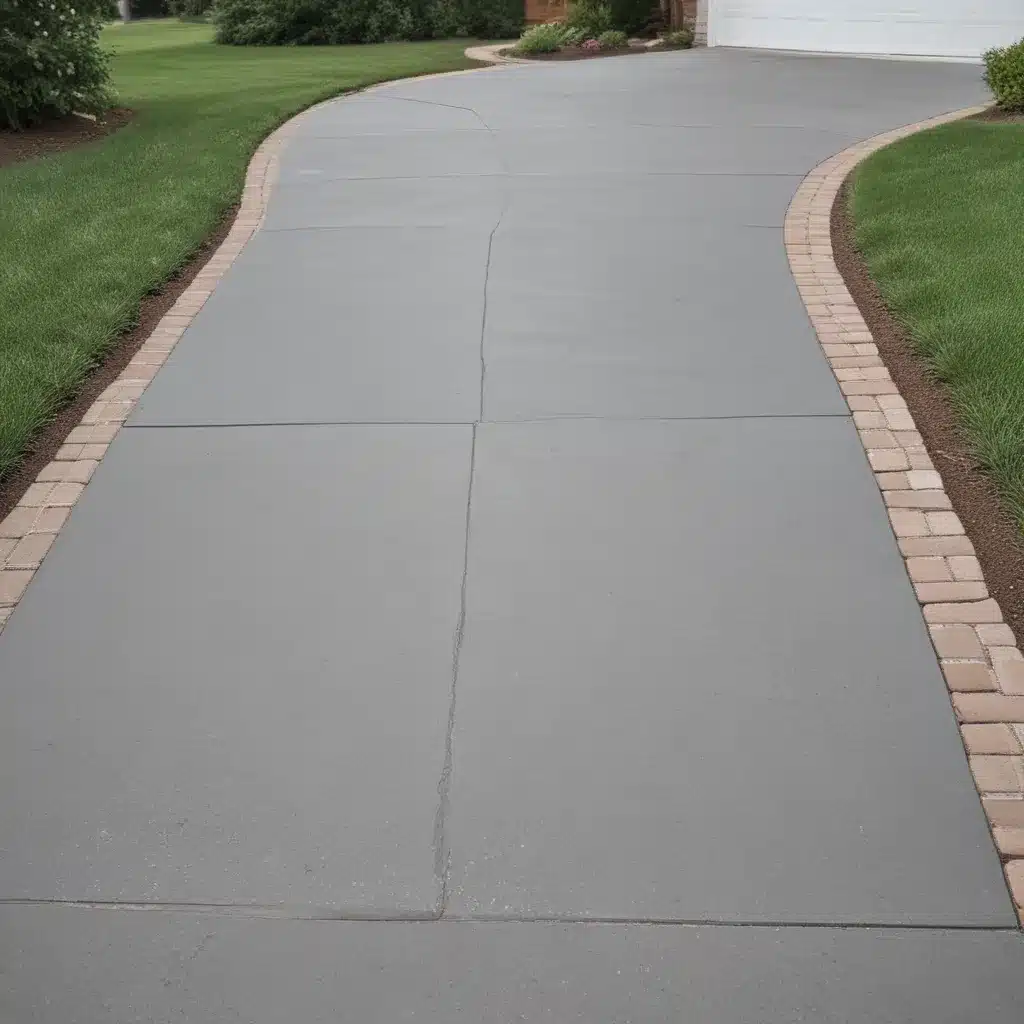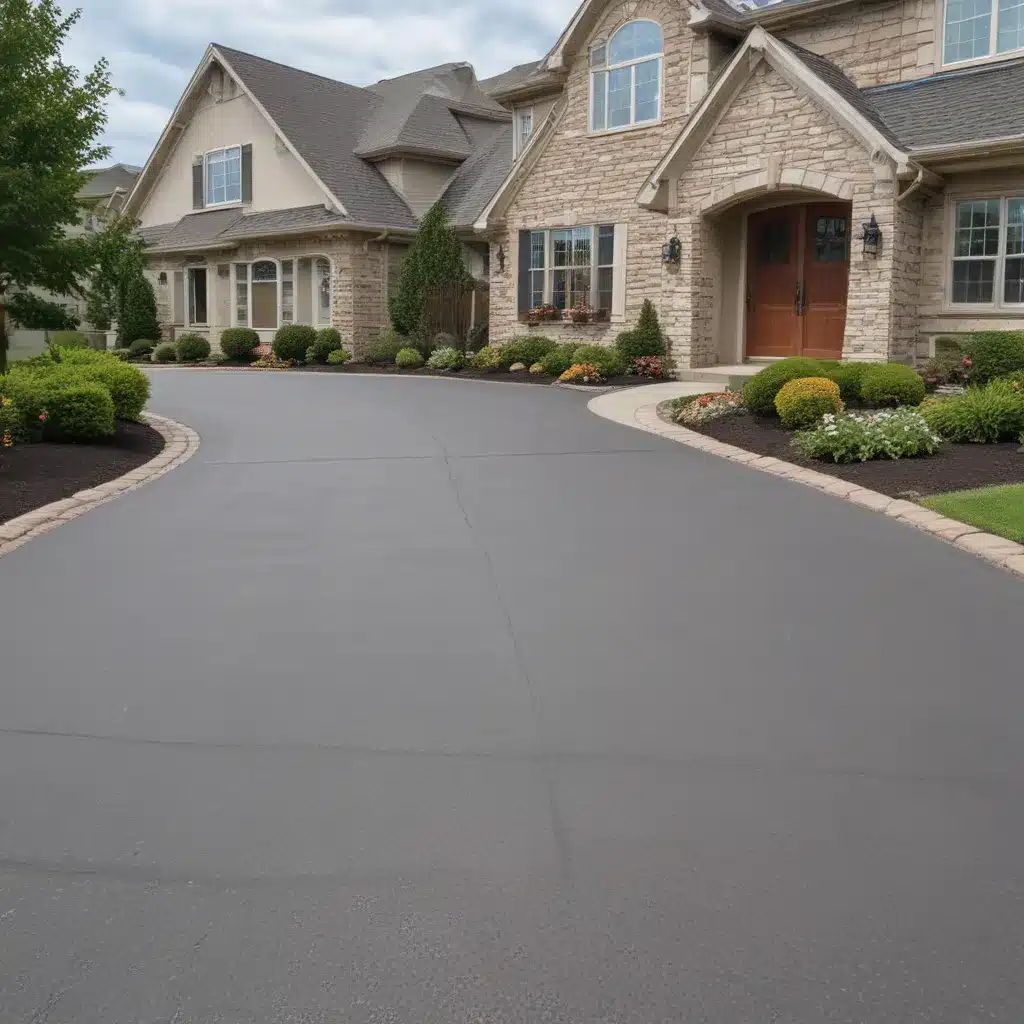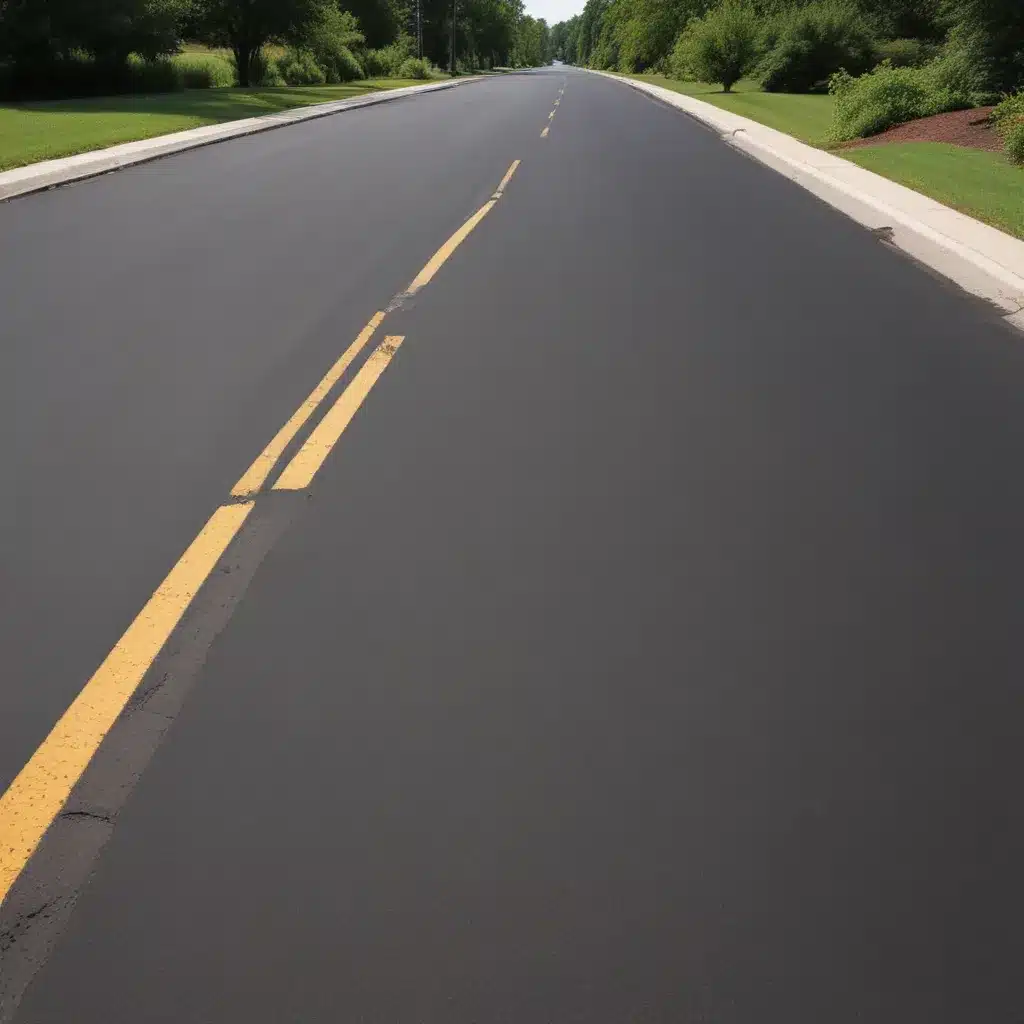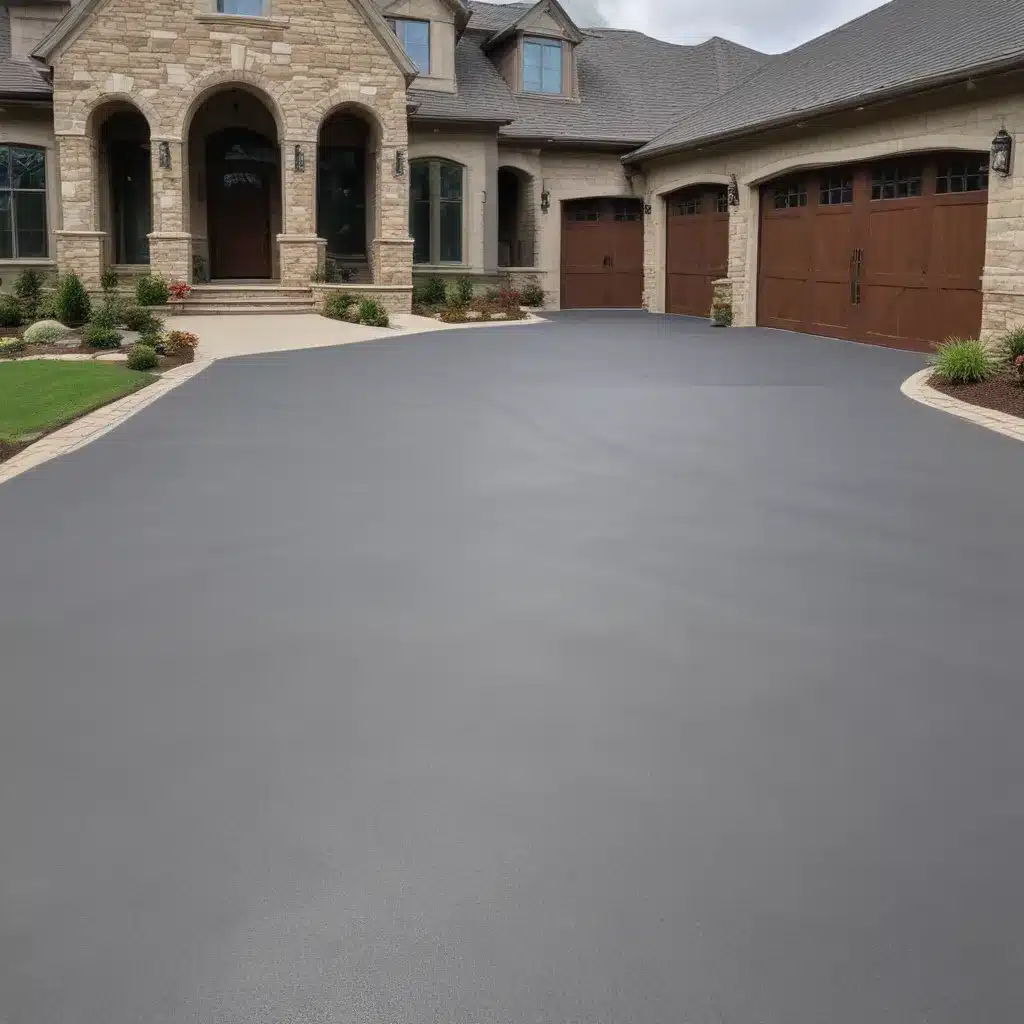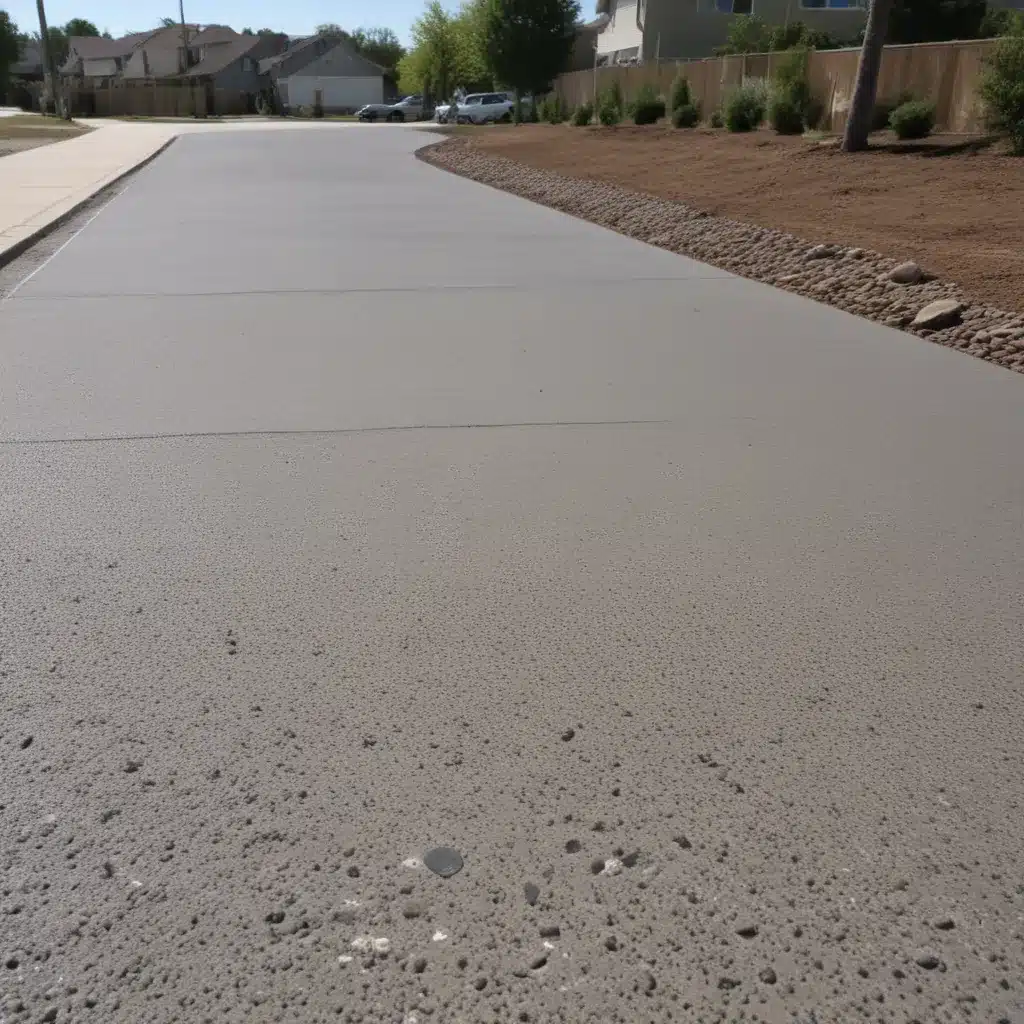Concrete Driveways: The Good, the Bad, and the Ugly
As a homeowner, the decision to install a new driveway is never an easy one. There are so many factors to consider – cost, aesthetics, durability, and maintenance, just to name a few. And let’s be honest, concrete driveways, while classic and sturdy, can be a real pain to maintain. The endless cycle of power washing, sealing, and patching cracks can quickly become a never-ending chore.
But fear not, my fellow homeowners! There are actually some pretty fantastic low-maintenance alternatives to concrete that are worth exploring. In this in-depth guide, I’ll take you on a journey through the wonderful world of driveway options, from the sleek and modern to the rustic and charming. We’ll dive into the pros and cons of each, so you can make an informed decision that fits your lifestyle and budget.
So, put on your thinking cap, grab a cup of coffee (or something stronger, no judgment here), and let’s get ready to pave the way to driveway bliss. Trust me, your future self will thank you.
Asphalt Driveways: The Smooth Operator
When it comes to low-maintenance driveway alternatives, asphalt is a solid (pun intended) choice. Asphalt driveways offer a smooth, seamless look that can complement a wide range of home styles, from traditional to contemporary. The best part? They’re relatively easy to maintain, with a simple routine of sealcoating every few years to keep them looking fresh.
But don’t just take my word for it. Let’s break down the pros and cons of asphalt driveways:
Pros:
– Cost-effective: Asphalt is generally more affordable than concrete, making it a budget-friendly option.
– Smooth surface: Asphalt provides a silky-smooth driving and walking experience, which is a major plus for those with mobility concerns.
– Quicker installation: Asphalt driveways can typically be installed in a matter of days, compared to the weeks it can take for concrete.
– Easier repairs: Minor cracks and potholes in asphalt can be easily patched, whereas concrete often requires more extensive (and expensive) fixes.
Cons:
– Limited lifespan: Asphalt driveways have a shorter lifespan compared to concrete, typically lasting around 12-20 years before needing to be replaced.
– Susceptibility to weather: Asphalt can be more prone to damage from extreme temperatures, UV exposure, and heavy rainfall.
– Aesthetic limitations: While asphalt can look sleek, it may not have the same level of customization options as concrete or other materials.
So, if you’re looking for a cost-effective, low-maintenance driveway option that can provide a smooth ride, asphalt might just be the perfect fit. Just be sure to factor in its relatively shorter lifespan when making your decision.
Brick Pavers: The Charming Champ
Now, let’s talk about brick pavers – the charming and customizable alternative to boring old concrete. These little beauties not only add a touch of old-world elegance to your home, but they’re also incredibly durable and easy to maintain.
One of the biggest advantages of brick pavers is their versatility. You can choose from a wide range of colors, patterns, and styles to create a truly unique look that complements your home’s architecture. And the best part? If a individual paver gets damaged, you can simply replace it without having to redo the entire driveway.
But don’t just take my word for it. Let’s dive into the pros and cons of brick pavers:
Pros:
– Customizable design: With so many color and pattern options, you can create a truly one-of-a-kind driveway that reflects your personal style.
– Durability: Brick pavers are incredibly tough and can withstand heavy use, as well as extreme weather conditions.
– Easy maintenance: Maintaining a brick paver driveway is a breeze – a simple sweep and the occasional power wash is all it takes to keep it looking its best.
– Increased property value: Brick pavers are often seen as a premium upgrade, which can add significant value to your home.
Cons:
– Higher upfront cost: Brick pavers can be more expensive to install than other driveway materials, such as asphalt or concrete.
– Potential for uneven settling: Over time, the individual pavers can shift and settle, leading to an uneven surface that can be tricky to fix.
– Weeds and moss growth: If not properly maintained, brick pavers can be susceptible to weed and moss growth, which can detract from their otherwise pristine appearance.
So, if you’re willing to make a bit of an investment upfront, brick pavers can be a truly stunning and low-maintenance option for your driveway. Just be sure to factor in the potential for maintenance and the occasional paver replacement down the line.
Gravel Driveways: The Rustic Retreat
Now, let’s take a step away from the sleek and modern and explore the charming world of gravel driveways. These natural beauties offer a refreshing alternative to the traditional concrete or asphalt options, and they can be a true delight for the senses.
Imagine the satisfying crunch of gravel beneath your feet as you make your way up to your front door, the warm, earthy tones complementing the natural surroundings of your property. It’s like stepping into a cozy, rustic retreat, all while enjoying the low-maintenance benefits of a gravel driveway.
But don’t just take my word for it. Let’s delve into the pros and cons:
Pros:
– Natural aesthetic: Gravel driveways offer a beautiful, natural look that can seamlessly blend with a more rural or country-inspired setting.
– Affordable installation: Compared to other driveway materials, gravel is generally one of the most cost-effective options to install.
– Easy maintenance: Maintaining a gravel driveway is a breeze – a quick raking or replenishing of the gravel every so often is usually all it takes.
– Permeable surface: Gravel driveways allow water to easily drain through, reducing the risk of pooling and puddles.
Cons:
– Potential for weed growth: If not properly maintained, gravel driveways can be susceptible to weed growth, which can detract from the overall aesthetic.
– Potential for displacement: Over time, the gravel can become displaced, particularly in high-traffic areas, requiring regular replenishment.
– Dust and loose gravel: Gravel driveways can sometimes produce dust and loose stones, which can be a nuisance for both drivers and pedestrians.
So, if you’re looking to embrace a more rustic and natural vibe, a gravel driveway might be the perfect low-maintenance solution for you. Just be prepared to do a bit of light maintenance to keep it looking its best.
Permeable Pavers: The Eco-Friendly Superstar
As we continue our journey through the world of low-maintenance driveway alternatives, it’s time to introduce you to the eco-friendly superstar: permeable pavers. These innovative paving materials not only look stunning, but they also help to reduce the environmental impact of traditional concrete or asphalt driveways.
The magic of permeable pavers lies in their unique design, which allows water to easily drain through the gaps between the individual pavers. This not only helps to prevent unsightly puddles and reduces the risk of flooding, but it also helps to recharge the groundwater supply. It’s a win-win for both you and the environment!
But don’t just take my word for it. Let’s dive into the pros and cons of permeable pavers:
Pros:
– Eco-friendly design: Permeable pavers help to reduce stormwater runoff and promote natural groundwater recharge, making them a sustainable choice for your driveway.
– Attractive appearance: Permeable pavers come in a wide range of colors, shapes, and styles, allowing you to create a truly unique and visually appealing driveway.
– Durability: Permeable pavers are incredibly tough and can withstand heavy use and extreme weather conditions, making them a long-lasting investment.
– Easy maintenance: Maintaining a permeable paver driveway is relatively straightforward – a simple sweep and occasional power wash is usually all it takes to keep it looking its best.
Cons:
– Higher upfront cost: Permeable pavers can be more expensive to install than traditional concrete or asphalt driveways, though the long-term environmental benefits may offset the initial investment.
– Potential for clogging: Over time, the gaps between the pavers can become clogged with debris, which can reduce the effectiveness of the permeable design.
– Specialized installation: Proper installation is crucial for permeable pavers to function as intended, so you’ll need to work with a skilled contractor to ensure the job is done right.
So, if you’re looking for a low-maintenance driveway option that also boasts impressive eco-friendly credentials, permeable pavers might just be the perfect choice for you. Just be prepared to make a slightly larger upfront investment for the long-term benefits.
Grasscrete: The Verdant Vanguard
As we continue our exploration of low-maintenance driveway alternatives, it’s time to introduce you to the verdant vanguard: Grasscrete. This innovative paving system combines the durability of concrete with the natural beauty of a lush, green lawn, creating a truly unique and visually stunning driveway solution.
Grasscrete works by using a specialized concrete grid system that allows grass to grow up through the openings, creating a seamless and natural-looking surface. Not only does this provide a visually appealing aesthetic, but it also helps to reduce the overall environmental impact of your driveway by allowing water to easily drain and promoting the growth of vegetation.
But don’t just take my word for it. Let’s dive into the pros and cons of Grasscrete:
Pros:
– Natural, verdant appearance: Grasscrete driveways offer a stunning, natural aesthetic that seamlessly blends with the surrounding landscape.
– Eco-friendly design: The grass-filled grid system helps to reduce stormwater runoff and promote groundwater recharge, making Grasscrete a sustainable choice for your driveway.
– Durable and load-bearing: Despite its natural appearance, Grasscrete is designed to be incredibly durable and able to withstand heavy use, including the weight of vehicles.
– Low maintenance: Maintaining a Grasscrete driveway is relatively straightforward – a simple mowing and occasional weeding is usually all it takes to keep it looking its best.
Cons:
– Higher installation costs: Compared to some other driveway materials, Grasscrete can be more expensive to install, though the long-term benefits may offset the initial investment.
– Potential for weed growth: If not properly maintained, the grass-filled grid system can be susceptible to weed growth, which can detract from the overall aesthetic.
– Specialized installation: Proper installation is crucial for Grasscrete to function as intended, so you’ll need to work with a skilled contractor to ensure the job is done right.
So, if you’re looking for a low-maintenance driveway option that offers a truly unique and natural-looking aesthetic, Grasscrete might just be the perfect choice for you. Just be prepared to make a slightly larger upfront investment for the long-term environmental and aesthetic benefits.
Decorative Gravel: The Elegant Escape
As we dive deeper into the world of low-maintenance driveway alternatives, it’s time to explore the elegant escape that is decorative gravel. While traditional gravel driveways offer a rustic charm, decorative gravel takes things to a whole new level, combining the natural beauty of stones with a touch of sophistication.
Decorative gravel comes in a wide range of colors, sizes, and textures, allowing you to create a truly customized look that complements the architecture and landscaping of your home. From sleek, angular river rocks to the warm, earthy tones of crushed granite, the possibilities are endless.
But don’t just take my word for it. Let’s take a closer look at the pros and cons of decorative gravel driveways:
Pros:
– Customizable aesthetic: With so many color and texture options, you can create a decorative gravel driveway that perfectly matches your personal style and the overall design of your property.
– Low maintenance: Decorative gravel driveways are relatively easy to maintain, requiring little more than an occasional raking or replenishing to keep them looking their best.
– Permeable surface: Like traditional gravel, decorative gravel allows water to easily drain through, reducing the risk of pooling and puddles.
– Increased property value: A well-designed decorative gravel driveway can be a significant selling point, potentially increasing the value of your home.
Cons:
– Potential for weed growth: If not properly maintained, decorative gravel driveways can be susceptible to weed growth, which can detract from the overall aesthetic.
– Potential for displacement: Over time, the gravel can become displaced, particularly in high-traffic areas, requiring regular replenishment.
– Dust and loose gravel: Decorative gravel driveways can sometimes produce dust and loose stones, which can be a nuisance for both drivers and pedestrians.
So, if you’re looking to elevate the curb appeal of your home with a low-maintenance driveway solution, decorative gravel might just be the perfect choice. Just be prepared to do a bit of light maintenance to keep it looking its best.
Porous Concrete: The Sustainable Superstar
As we continue our journey through the world of low-maintenance driveway alternatives, it’s time to introduce you to the sustainable superstar: porous concrete. This innovative paving material offers a unique and eco-friendly solution that sets it apart from the traditional concrete driveways we all know and (sometimes) love.
The magic of porous concrete lies in its ability to allow water to easily drain through, rather than creating the pooling and puddles that can be a common issue with traditional concrete. This not only helps to reduce the risk of flooding, but it also promotes the natural recharge of groundwater supplies – a true win-win for both you and the environment.
But don’t just take my word for it. Let’s dive into the pros and cons of porous concrete driveways:
Pros:
– Eco-friendly design: Porous concrete helps to reduce stormwater runoff and promote natural groundwater recharge, making it a sustainable choice for your driveway.
– Durable and long-lasting: Porous concrete is designed to be incredibly durable and can withstand heavy use and extreme weather conditions, making it a long-term investment.
– Customizable appearance: While not as visually versatile as some other driveway materials, porous concrete can still be tinted or stamped to complement the look of your home.
– Easy maintenance: Maintaining a porous concrete driveway is relatively straightforward – a simple sweeping and occasional power washing is usually all it takes to keep it looking its best.
Cons:
– Higher installation costs: Compared to traditional concrete, porous concrete can be more expensive to install, though the long-term environmental benefits may offset the initial investment.
– Potential for clogging: Over time, the porous surface can become clogged with debris, reducing the effectiveness of the water drainage system.
– Specialized installation: Proper installation is crucial for porous concrete to function as intended, so you’ll need to work with a skilled contractor to ensure the job is done right.
So, if you’re looking for a low-maintenance driveway option that also boasts impressive eco-friendly credentials, porous concrete might just be the perfect choice for you. Just be prepared to make a slightly larger upfront investment for the long-term benefits.
The Final Verdict: Choosing Your Low-Maintenance Driveway
Well, there you have it, my fellow homeowners – a comprehensive tour through the wonderful world of low-maintenance driveway alternatives. From the smooth and sleek asphalt to the verdant and visually stunning Grasscrete, each option has its own unique pros and cons to consider.
As you weigh your options, it’s important to think about your lifestyle, budget, and the overall aesthetic you’re hoping to achieve. Are you drawn to the rustic charm of a gravel driveway, or do you prefer the modern elegance of permeable pavers? Perhaps you’re looking to make a sustainable statement with porous concrete or Grasscrete.
No matter which route you choose, I can assure you that any of these low-maintenance alternatives will save you countless hours of back-breaking work compared to a traditional concrete driveway. And let’s be honest, who doesn’t love a little more free time to sit back, relax, and enjoy the fruits of their labor (or, in this case, the lack thereof)?
So, take a deep breath, grab a pen and paper, and start jotting down your must-haves. With a little bit of research and a whole lot of creativity, I’m confident you’ll find the perfect low-maintenance driveway solution that checks all your boxes. And hey, maybe you’ll even have some fun along the way – after all, who says choosing a driveway can’t be an adventure?
Happy paving, my friends!
